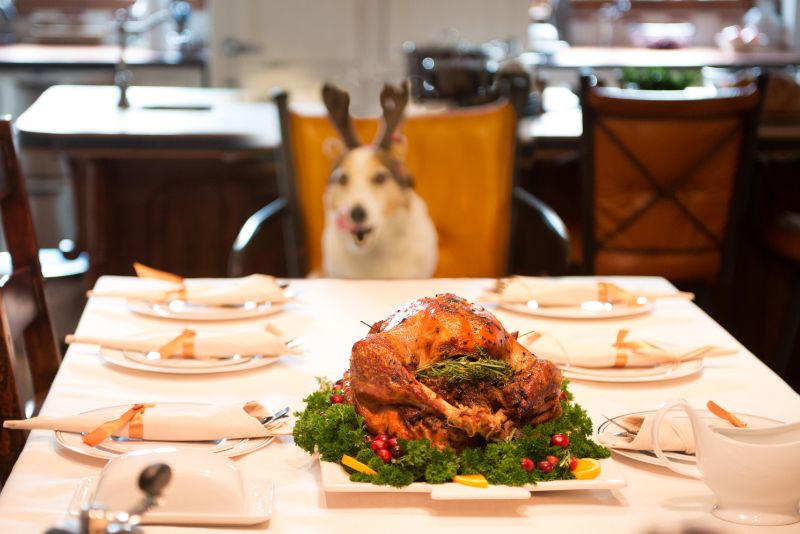Let’s Talk Turkey: Thanksgiving Pet Safety

Thanksgiving is fast approaching, a fact that has most Americans jumping for joy. Between the turkey, stuffing, casseroles, and desserts, there’s something on the Thanksgiving table for everyone. But wait – does that include our pets?
Most of us have a hard time resisting those puppy dog eyes, but there are some things you should know about Thanksgiving. When it comes to Thanksgiving pet safety, we aren’t just talking turkey.
Keep reading to find out about some of the common holiday pet disasters that can land you in the emergency animal clinic this year, as well as ways to keep your pets safe on Thanksgiving and beyond.
Pets and Thanksgiving Food Risks
As delicious as Thanksgiving foods are to most humans, many can be downright dangerous for pets. Pets don’t self regulate when it comes to toxic foods, so it’s up to responsible pet owners to know what is risky, and protect our pets from partaking. Here are some tips to prevent pet poisoning.
The dinner. Fatty and salty foods (read: Thanksgiving dinner) are hard for animals to digest. What’s more, even a bite or two can cause a life-threatening and painful condition called pancreatitis. Likewise, some holiday foods that are healthy for people are toxic to pets – such as raisins, grapes, onions, and garlic.
Skip dessert, too. Sugary foods can send pets into a digestive tailspin. Chocolate is toxic to pets, and so is a sugar substitute called Xylitol – a common ingredient in sugar free desserts, gum, and candy. Keep all desserts and treats far away from pets.
Garbage hound? Between the feasting and talking with friends and family, it’s easy for a pet to sneak into the trash or countertop leftovers. The resulting conditions are aptly known as “garbage gut” in the animal emergency room. Clear leftovers right away, and discard the turkey carcass, any strings, wrappers, and aluminum foil securely in the trash. Trash bins should have tight fitting lids, or even better – be behind a closed and locked door that your pets can’t access.
Tasty decor. Holiday plants may make a beautiful centerpiece, but be aware that some plants are toxic to pets. These include amaryllis, cyclamen, hydrangea, and some ferns. The ASPCA has a good guide to toxic plants for dogs and cats. To be on the safe side, keep your pet away from all plants and table decor.
If you think your pet has eaten something toxic, call your local emergency clinic immediately for guidance.
Party Animals
If your pet loves a houseful of people, by all means let them participate. It’s not uncommon for noise, changing routines, and lots of people to make pets feel anxious and stressed. Here are some tips for Thanksgiving pet safety when you’re entertaining the masses.
Creature comforts. Give your pet a safe spot away from the action. Set up a laundry room, small back bedroom, or the like with their bed, toys, food and water, and a white noise machine or soft music. Check on them often and give them lots of praise and attention. They’ll be away from the stress of the day, and you’ll relax knowing they are safe.
Read the signs. Even the most loving pets can become stressed enough to bite. Know the signs and educate everyone at your house about how to approach your pet. Encourage gentleness in children, and never leave pets and children alone together.
Escape routes. With all the comings and goings of Thanksgiving, it’s easy for your pet to slip out the door or out the back gate and become lost. Be very watchful, and if you have a worry, put your pet on a leash to greet guests as they arrive. Make sure all pets have collar and ID tags. Placing a microchip (and ensuring its registered to your current contact info) gives pets the best chance of a reunion with you should they become lost.
Travel Tips for Thanksgiving Pet Safety
If you are traveling with your pet this Thanksgiving there are a few safety tips to remember. Here’s how to keep your pet safe while going over the river and through the woods.
- Research airline rules for pet travel early
- Contact us for an appointment to get your pet’s health certificate within 10 days of travel across state lines or internationally
- Practice safe pet restraint in vehicles, if traveling by car
- Never leave your pet alone in a parked car
- If you’ll be leaving your pet alone, interview pet sitters or boarding kennels early
Taking your pet along on a trip means packing for her as well as yourself. In addition to her bed, food, and medications, make sure to pack her medical records, a recent picture, toys, and a pet first aid kit.
If you have questions about Thanksgiving pet safety, please call us. And from our Volunteer Veterinary Hospital family to yours, Happy Thanksgiving!

